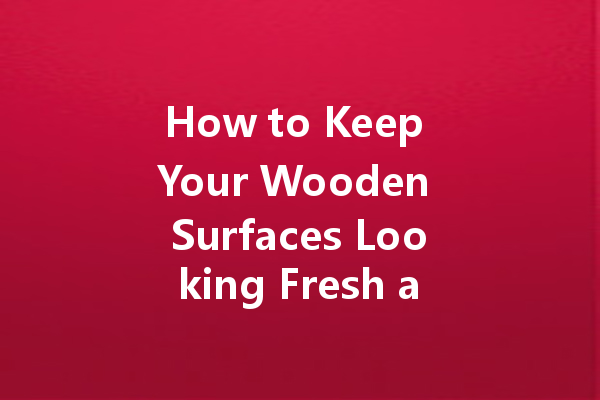Wooden surfaces add warmth and charm to any home. Whether it’s your dining table, cabinets, or wooden floors, keeping these surfaces looking fresh and polished is essential for maintaining their beauty and longevity. In this article, we will explore practical tips and techniques to ensure your wooden furniture remains in pristine condition.
Understanding the Importance of Wood Care
Maintaining wooden surfaces goes beyond aesthetics; it protects your investment. Wood is susceptible to scratches, stains, and fading. Regular care ensures that your furniture doesn’t just look good but also lasts for years to come. Polishing your wood surfaces creates a protective layer, enhancing their natural shine while preventing damage from spills and dirt.
Choosing the Right Wood Polish
Not all wood polishes are created equal. Selecting the best product is crucial to ensure you enhance the beauty of your furniture without causing harm. There are two main types of wood polish: oil-based and water-based.
Oil-Based Polishes
Oil-based polishes penetrate deeper into the wood, providing nourishment and a rich appearance. However, they can take longer to dry and may emit strong odors. If your wood is dull and thirsty, this type may be the best option.
Water-Based Polishes
On the other hand, water-based polishes dry quickly, have low VOC emissions, and are easier to clean up. They offer a more subtle shine and are ideal for those who prefer a quick application process. Choose a polish that suits your needs and the specific type of wood you have.
How to Properly Apply Wood Polish
To achieve the best results, it’s essential to apply wood polish correctly. Here are some steps to guide you through the process:
Step 1: Clear the Surface
Before polishing, ensure that the surface is clean. Dust and debris can scratch the wood while polishing. Use a microfiber cloth to wipe down the piece and remove any loose particles.
Step 2: Test First
Always perform a spot test in an inconspicuous area to ensure that the polish doesn’t react negatively with your wood. This step can save you from potential mishaps.
Step 3: Apply the Polish
Using a soft cloth, apply a small amount of wood polish. It’s best to work with the grain of the wood for an even finish. Avoid using too much polish, as this can lead to a waxy buildup.
Step 4: Buff the Surface
Once the polish is applied, buff the surface with a clean, dry cloth. This step will help to bring out the shine and ensure even distribution.

The Best DIY Wood Polish Recipes for a Natural Shine
For those who prefer a more sustainable approach, making your own wood polish at home is a worthwhile alternative. Here are two simple recipes:
Olive Oil and Vinegar Polish
Mix equal parts of olive oil and white vinegar in a spray bottle. Shake well and apply it to the wooden surface using a soft cloth. The vinegar cleans while the oil nourishes the wood, giving it a lovely shine.
Beeswax and Lemon Essential Oil Polish
Melt beeswax and mix with a bit of coconut oil and a few drops of lemon essential oil. This combination not only smells wonderful but also creates a protective barrier against moisture and dirt.
Caring for Different Types of Wooden Surfaces
Each type of wooden surface may require special care. Here are some tips for commonly found wooden furniture:
Dining Tables
Wipe spills immediately to prevent stains. Regularly polish your dining table to keep it looking its best.
Wooden Floors
For floors, use a cleaner specifically designed for wood and follow up with a polish. This helps maintain the finish and adds shine without leaving residue.
Antique Furniture
Antiques often require special care. Use gentle cleaners and always test before full application. Polishing should be minimal to preserve the original finish.
Regular Maintenance for Lasting Beauty
To keep your wooden surfaces looking fresh, establish a regular maintenance routine. Dust surfaces weekly and polish them every few months, depending on wear and tear. Avoid placing hot items directly on wood, use coasters and placemats to prevent damage.
Conclusion
Keeping your wooden surfaces looking fresh and polished doesn’t have to be a chore. With the right techniques and products, you can enhance the beauty of your furniture while safeguarding it against damage. Whether you opt for store-bought polish or DIY recipes, the key is to establish a consistent care routine. Embrace the natural beauty of wood, and enjoy a home filled with warmth and elegance.
